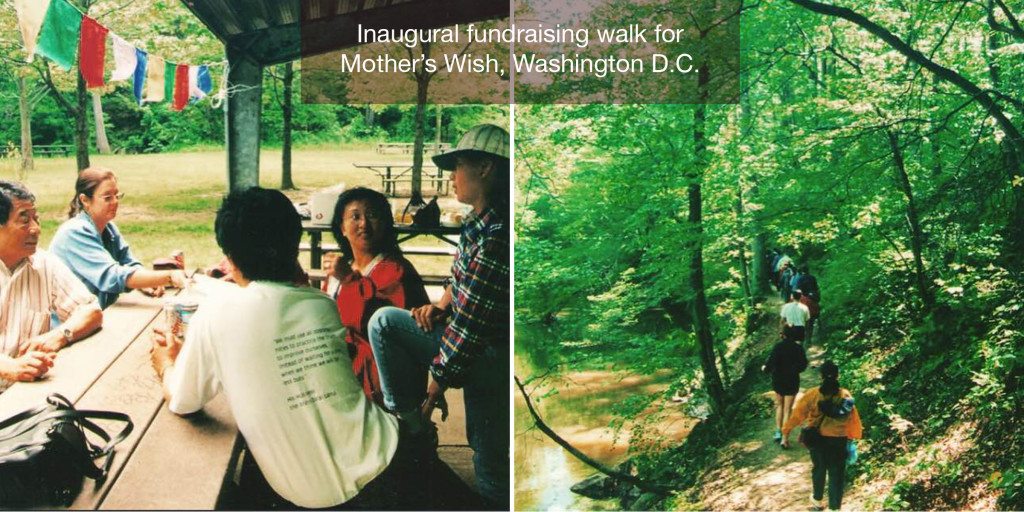Mother's Wish Foundation
Equal access to opportunity can change the world.
Machik works to help bridge the gender divide by giving girls and young women equal access to educational opportunities.
Machik works to help bridge the gender divide by giving girls and young women equal access to educational opportunities.
From the very beginning of Machik’s work, we have been dedicated to women’s empowerment on many levels, most especially in education. Indeed, gender equality is one of our most fundamental values. When Dr. Losang Rabgey traveled to Rebgong, Amdo (Qinghai) in 2002, it was clear that many young women, particularly those from low-income rural families, did not have equal access to formal education. In 2003, Mother’s Wish was developed and launched to support education for young girls and women in Amdo. Through a selection process managed by our Mother’s Wish team in Rebgong, we identified young women from economically disadvantaged families who demonstrated a special aptitude to learn. Originally founded by an annual fundraising walk in Washington DC to provide scholarships for four students, Mother’s Wish grew to support over 2000 young women over the years who would not otherwise have been able to continue their education. Many graduated from middle school, high school, college, and post-graduate education.
Machik volunteer Maddie Jorden created this Mother's Wish video in 2015.
Mother’s Wish was established in Rebong, Amdo, as a registered NGO in its own right, and has helped many young women earn their undergraduate degrees. Over 2,000 girls and women have received support from this program. Machik is proud to have created this program with local educators and grateful to have been an angel sponsor of Mother’s Wish, providing operation costs for many years.
Impact of Mother's Wish
“Your assistance brings us hope. Because of you, we can enjoy learning knowledge.” – Dorje Tso
“My desire is to help others through healing and giving knowledge. This will be a way to give back from the economic support that I have received, the love that I have received and to share it with others.” – Lumo Tsering
“As an orphan, I felt that I had been cursed when I was younger, so I used to be very shy and quiet. I felt lost and without love, but with MWF and receiving so much support from strangers, I have felt very loved and supported.” – Tserang Tso
“I never think that I could go to college, even I didn’t make dream about that. “– Yinji Dolma
“I would like to say thank you very much from the depths of my heart and also thanks to the members of the Mother’s Wish Foundation that I have got the greatest support from all of you.” – Pakmo
“My desire is to help others through healing and giving knowledge. This will be a way to give back from the economic support that I have received, the love that I have received and to share it with others.” – Lumo Tsering
“As an orphan, I felt that I had been cursed when I was younger, so I used to be very shy and quiet. I felt lost and without love, but with MWF and receiving so much support from strangers, I have felt very loved and supported.” – Tserang Tso
“I never think that I could go to college, even I didn’t make dream about that. “– Yinji Dolma
“I would like to say thank you very much from the depths of my heart and also thanks to the members of the Mother’s Wish Foundation that I have got the greatest support from all of you.” – Pakmo
Mother's Wish Foundation Testimonials
"Because someone is generous enough to give me this opportunity, I feel very motivated to do well"
At twenty-nine years old, with a master’s degree from the Northwestern University for Nationalities, and employed by the department of Industry and Information in Lhasa, Namtso Kyi is a mature example of what young Tibetan women, even those who come from families of limited resources, can aspire to achieve: education, employment, choice.
Namtso Kyi was born as one of eight children to a traditional farming family in Gyang Gyal village near Rebgong. None of those seven siblings, three brothers and four sisters, went to college, either because they didn’t want to or didn’t see it as a possibility, but Namtso Kyi was different. In order for a girl in her situation to go to college, you must have large doses of talent and determination, and Namtso Kyi had both.
Her parents being relatively old by the time she entered school, Namtso Kyi’s eldest brother, a teacher, led the household. During high school, Namtso Kyi was singled out for a scholarship from the Trace Foundation because of her exceptional performance on a standardized test, which allowed her to continue her studies and gave her the unique opportunity to live and attend school in Xining, the provincial capital, for one year. Upon graduating from high school, she again scored well on her placement exams, but this year there were very limited spots for sponsorship from the Trace Foundation—less spots than students currently in the program. Facing a dead end, she sought alternate ways to continue funding her education, discovered Mother’s Wish Foundation, applied and was happily accepted.
“My family was deeply grateful” for the assistance “because it relieved the whole family of the economic burden of paying for my schooling. There are very limited income resources for my family.”
What motivated her to continue studying? “Receiving support from strangers. Because someone is generous enough to give me this opportunity, I feel very motivated to do well.” And she did do well, persisting through both an undergraduate and graduate degree in a very competitive system that requires you to do better than your peers in order to continue studying.
Namtso Kyi isn’t sure what the future holds for her career or personal life, and there is beauty in that. For unlike a great many young women her age, she faces choices down the road, thanks to the doors that have been opened to her by her college degree.
Namtso Kyi was born as one of eight children to a traditional farming family in Gyang Gyal village near Rebgong. None of those seven siblings, three brothers and four sisters, went to college, either because they didn’t want to or didn’t see it as a possibility, but Namtso Kyi was different. In order for a girl in her situation to go to college, you must have large doses of talent and determination, and Namtso Kyi had both.
Her parents being relatively old by the time she entered school, Namtso Kyi’s eldest brother, a teacher, led the household. During high school, Namtso Kyi was singled out for a scholarship from the Trace Foundation because of her exceptional performance on a standardized test, which allowed her to continue her studies and gave her the unique opportunity to live and attend school in Xining, the provincial capital, for one year. Upon graduating from high school, she again scored well on her placement exams, but this year there were very limited spots for sponsorship from the Trace Foundation—less spots than students currently in the program. Facing a dead end, she sought alternate ways to continue funding her education, discovered Mother’s Wish Foundation, applied and was happily accepted.
“My family was deeply grateful” for the assistance “because it relieved the whole family of the economic burden of paying for my schooling. There are very limited income resources for my family.”
What motivated her to continue studying? “Receiving support from strangers. Because someone is generous enough to give me this opportunity, I feel very motivated to do well.” And she did do well, persisting through both an undergraduate and graduate degree in a very competitive system that requires you to do better than your peers in order to continue studying.
Namtso Kyi isn’t sure what the future holds for her career or personal life, and there is beauty in that. For unlike a great many young women her age, she faces choices down the road, thanks to the doors that have been opened to her by her college degree.
“When I found out, I was exhilarated, because I was deeply aware that my family could not continue to afford my schooling.”
“As an orphan, I felt that I had been cursed when I was younger, so I used to be very shy and quiet. I was lost and without love. But with Mother’s Wish and receiving so much support from strangers, I have felt very loved and supported. Mother’s Wish provides the support that is the role of every mother and that exists in every mother’s heart: to care for their child.”
For rural Tibetan families who depend on farming or herding for their livelihood, mustering the necessary funds to send all or even one of their children to college can be difficult. The challenge is all the more present for those living in single or nonparent households, where the expenses are the same but income-generating power is decreased.
Tserang Tso lost her parents when she was very young and so grew up alongside her younger sister under the guidance of her grandparents. The family was also responsible for taking care of her great-grandmother, who lived in the household with them. With three elders in the family and no extra labor, the family’s financial situation was constantly tight, circumstances that would typically endanger its children’s education. However, Tserang Tso demonstrated exceptional capacity as a student, and her enthusiasm for her studies kept her in school, despite the fact that her sister had dropped out after the fourth grade in order to help out around the house.
During her sophomore year of high school, Tserang Tso heard about an organization called Mother’s Wish Foundation (MWF) that provided scholarships to female students in the area, so she applied for sponsorship and was accepted. “When I found out, I was exhilarated, because I was deeply aware that my family could not continue to afford my schooling.”
When we meet her, Tserang Tso has just graduated from Qinghai University with a master’s degree in translation between Chinese and Tibetan. In a few months, she will begin work translating scripts at the Qinghai Television Center. Mother’s Wish supported her in her studies from 10th grade all the way through the completion of her undergraduate degree, covering tuition and including an allowance for living necessities. “Upon entering graduate school, there was no need for me to pay tuition anymore because of my academic performance. Mother’s Wish offered to continue supporting me and covering living expenses, but I declined, because it was my understanding that as a graduate student it should be my responsibility to find a part-time job.”
As with many of the Mother’s Wish students, who professedly have an acute awareness of the great generosity they have been shown by the anonymous donors who make the work of MWF possible, Tserang Tso is doing her best to pay that selflessness forward. “At one point, the Trace Foundation offered me a scholarship, and although initially I didn’t want to take it, the eventual small amount I did receive from them I chose to donate to an orphanage in my community. My experiences have strongly instilled in me the spirit of helping others.”
Tserang Tso’s family is incredibly proud of all that she has accomplished, one of only three or four students from her village to have received a master’s degree. I imagine that her parents would have been proud as well, to see their daughter’s academic success, which, in their absence, was only made possible by a community of good-hearted strangers.
For rural Tibetan families who depend on farming or herding for their livelihood, mustering the necessary funds to send all or even one of their children to college can be difficult. The challenge is all the more present for those living in single or nonparent households, where the expenses are the same but income-generating power is decreased.
Tserang Tso lost her parents when she was very young and so grew up alongside her younger sister under the guidance of her grandparents. The family was also responsible for taking care of her great-grandmother, who lived in the household with them. With three elders in the family and no extra labor, the family’s financial situation was constantly tight, circumstances that would typically endanger its children’s education. However, Tserang Tso demonstrated exceptional capacity as a student, and her enthusiasm for her studies kept her in school, despite the fact that her sister had dropped out after the fourth grade in order to help out around the house.
During her sophomore year of high school, Tserang Tso heard about an organization called Mother’s Wish Foundation (MWF) that provided scholarships to female students in the area, so she applied for sponsorship and was accepted. “When I found out, I was exhilarated, because I was deeply aware that my family could not continue to afford my schooling.”
When we meet her, Tserang Tso has just graduated from Qinghai University with a master’s degree in translation between Chinese and Tibetan. In a few months, she will begin work translating scripts at the Qinghai Television Center. Mother’s Wish supported her in her studies from 10th grade all the way through the completion of her undergraduate degree, covering tuition and including an allowance for living necessities. “Upon entering graduate school, there was no need for me to pay tuition anymore because of my academic performance. Mother’s Wish offered to continue supporting me and covering living expenses, but I declined, because it was my understanding that as a graduate student it should be my responsibility to find a part-time job.”
As with many of the Mother’s Wish students, who professedly have an acute awareness of the great generosity they have been shown by the anonymous donors who make the work of MWF possible, Tserang Tso is doing her best to pay that selflessness forward. “At one point, the Trace Foundation offered me a scholarship, and although initially I didn’t want to take it, the eventual small amount I did receive from them I chose to donate to an orphanage in my community. My experiences have strongly instilled in me the spirit of helping others.”
Tserang Tso’s family is incredibly proud of all that she has accomplished, one of only three or four students from her village to have received a master’s degree. I imagine that her parents would have been proud as well, to see their daughter’s academic success, which, in their absence, was only made possible by a community of good-hearted strangers.




